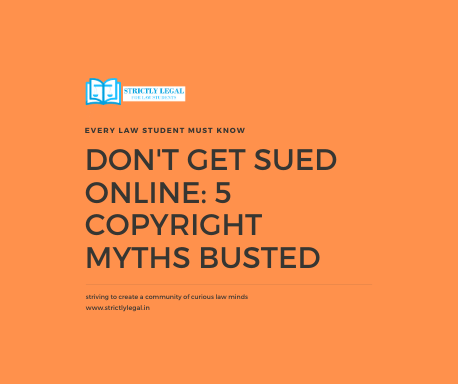In this article, we will discuss various copyright myths by which you could get sued on the internet (thanks to copyright laws). I would suggest you read this article in a way that would help you instead: How to not get sued on the Internet? Unless jail is your go-to holiday destination.
A lot of people on the internet including the whole bunch of self-proclaimed meme-makers break the laws on the internet every second. We do this very often and the reasons could be one of the following
- We think nobody gets caught
- We aren’t aware of the laws.
- We don’t care.
Unlike most laws, copyright law is a sort of law that would result in NO LIABILITY unless the person whose copyright you have infringed decides to take action. So it’s actually something like we’re waiting to mess with the wrong person.
These 5 myths will help educate you about your activities on the internet that could turn to be lethal if you do not mend your ways.
Table of Contents
First things first: What is Copyright?
For a strict definition of Copyright, you may refer to Section 14 in the Copyright Act, 1957. In a more generic sense copyright may refer to “an exclusive and assignable legal right, given to the originator for a fixed number of years, to print, publish, perform, film, or record literary, artistic, or musical material.” as defined by the oxford dictionary.
Let’s unlearn all the misinformation
This subject of copyright laws lacks the amount of education it needs especially amongthe young generation today. Let’s unlearn all the misinformation related to copyright laws and maybe this will be your first effort to not get sued online.
If something doesn’t have a copyright notice, it is not copyrighted
A copyright notice might look something like this:
2020 Copyright Strictlylegal.in ALL RIGHTS RESERVED.
If the content does not display a similar notice it doesn’t mean its not copyrighted. It would be insane to assume that if a house’s door is not locked it would be okay to trespass. The absence of a copyright notice has NO ACTUAL EFFECT on the protection of someone’s content under copyright law.
Crediting the creator of the content will protects you from liability
Crediting of the content creator can only save you if you are using the content as FAIR USE. This doesn’t mean you will re-upload the whole content on your name and put a credit at the bottom of the page. In case you want to reuse the content, you will either have to seek permission or obtain a paid license for the same.
The fair use blanket cover
A lot of videos and articles use copyrighted content under the blanket cover of FAIR USE. Now, the question remains, what is fair use?
Fair use is a difficult area to dive into but it is a savior for people who intend to use copyright content for personal, private, research, and or for criticism or review purposes. In India, fair use may also be referred to as fair dealing. The fair dealing or original content can be done without permission or licensing of the original work. You may read the entire thread on fair dealing from here: 52. Certain acts not to be infringement of copyright.
Everything on the Public Domain is free to use
Contents in public domain may refer to contents to which there’s no legal right. This maybe because the author has died and a certain amount of time has passed or the rights may have expired, forfeited or expressly waived.
Everything on the public domain is not free. Contents on social sites like Instagram, Facebook etc are definitely not public domains and hence stealing content from these social media will amount to infringement.
Not making money so no copyright Infringement
If you think that you’re not making money and you’re doing it for fun and there’s no liability… YOU ARE WRONG!
Even if you are not earning a penny, you will be liable. This is because you are killing the possibility of making money by the original content creator though the infringement you’re making.

Passionate about using the law to make a difference in people’s lives. An Advocate by profession.





